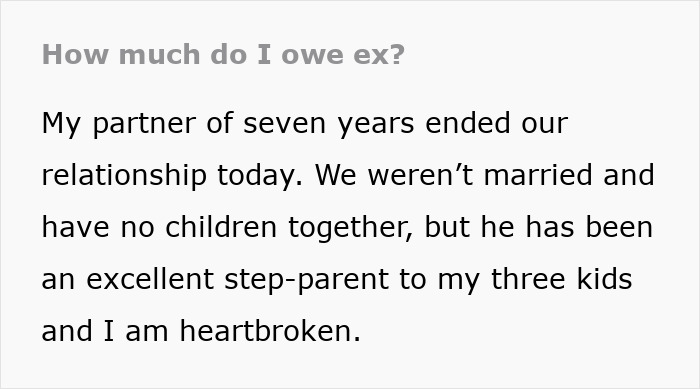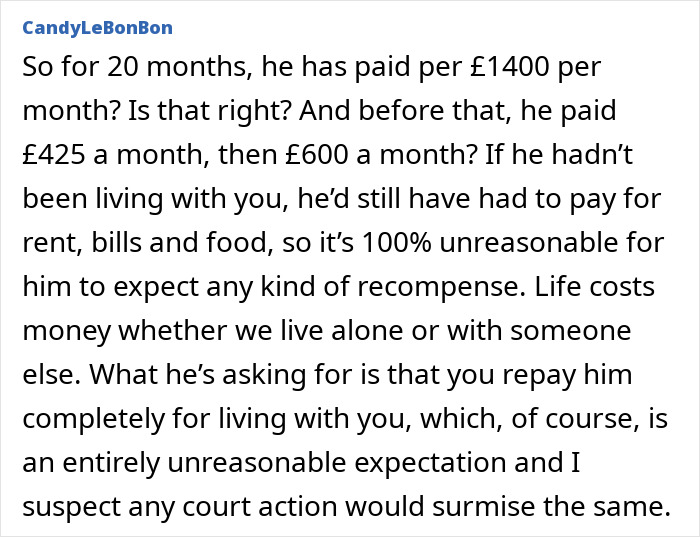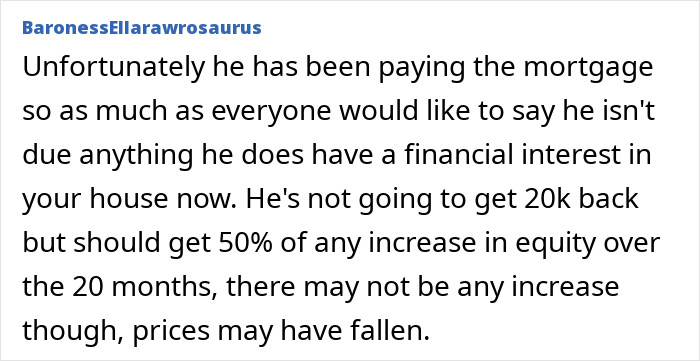As nice and simple as it can be to think of relationships as about love and emotions, at a certain point, if you are living together, money is going to come up as a topic. In some ways, this is an important test for any marriage, since people do need to manage their finances to get by, which also means making it work with your partner.
A woman turned to the internet for advice when her ex-husband suddenly started demanding thousands because he paid rent to her. In his view, because she used part of this rent to pay her mortgage on a house she owns, he felt entitled to a piece of this money.
Relationships and money can sometimes create a feeling of entitlement

A woman was unsure of what to do when her ex-husband started demanding £20,000 “Back” from her






A long-term relationship can muddle a person’s perspective of their partner’s money
Sometimes, ex-partners feel entitled to their former significant other’s money, which can be confusing and even infuriating for the person on the receiving end, especially when they’ve worked hard to move on emotionally, financially, and personally. But the reasons behind this behavior are often rooted in complex emotions, power dynamics, and outdated beliefs about what is “owed” after a breakup.
One of the most common sources of entitlement comes from the belief that being in a relationship, especially a long one, grants lasting access to financial benefits. This can take many forms: an ex who expects help with rent, one who thinks they deserve a share of new earnings, or someone who insists that past sacrifices (real or exaggerated) entitle them to ongoing support. Or perhaps the money this woman used to pay her mortgage.
They might say things like “I supported you when you had nothing” or “I helped build your success,” and in some cases, those claims may hold weight. But just as often, they ignore the fact that both people likely made sacrifices and contributions, and that breaking up typically ends shared financial obligations unless there are legal agreements like alimony or child support.
Another factor is jealousy, especially when one person lands on their feet faster than the other. If someone is struggling post-breakup while watching their ex thrive, it can breed resentment. Instead of seeing their ex’s success as separate from them, they may convince themselves that they somehow deserve a slice of it. This is particularly true when money becomes symbolic, representing stability, security, or emotional closure they haven’t found on their own. Rather than doing the hard work of rebuilding, they may fixate on what they think they’ve “lost” and how they can get some of it back.
Emotions and finances can be an unpleasant mix

Image credits: Dimaberlin / envato (not the actual photo)
Some people also conflate emotional investment with financial obligation. If they were emotionally supportive, paid for things during the relationship, or feel they “gave their best years” to someone, they might believe they’re owed compensation. This mindset often ignores the fact that relationships are not transactions. Giving love, time, or money does not entitle anyone to future returns, especially once the relationship ends. Importantly, there was nothing put to writing, which is a rookie mistake at the end of the day. Still, the idea of “I gave you everything” can be hard to let go of, particularly when someone feels used or abandoned.
In some cases, entitlement is less emotional and more strategic. An ex might ask for money simply because they assume the other person won’t say no. If they were used to relying on their ex during the relationship, they might continue to see them as a safety net, especially if that person is empathetic or avoids confrontation. This becomes even more likely if boundaries were never clearly established post-breakup. What feels like a small favor to one person can become a long-term expectation to the other.
Cultural and gender norms can also play a role. Some men are taught that if they financially supported a partner during the relationship, they deserve to retain control or influence afterward. Likewise, some women are socialized to believe that if they cared for a man emotionally or helped him become successful, he owes them compensation, even after parting ways. This might explain why she has to turn to strangers on the internet for what should be a clear-cut case. These narratives often don’t reflect the full story of a relationship, but they can influence how people justify asking for money after it’s over.
Ultimately, money after a breakup is about more than dollars and cents. It’s about power, closure, and boundaries. While some exes genuinely need help and ask with humility, others come from a place of resentment or entitlement. Learning to recognize the difference, and refusing to be guilted or manipulated, is key to maintaining emotional and financial independence. Just because you shared your life once doesn’t mean you’re financially responsible for someone forever.
Some folks asked for more details




Most readers thought he was out of his mind


















